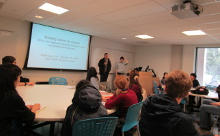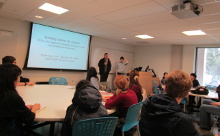- HOME
- Activities
- Project
- Project Details
2019 Australia Study Trip
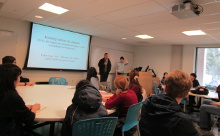
A 20-day Australia Study Trip began on 26 August to deepen our knowledge of immigration, multiculturalism and an aging society. We visited the four cities of Canberra, Melbourne, Sydney and Brisbane, where we had discussions at universities in each city and visited a number of companies, government offices and nursing homes. The trip provided an opportunity to think deeply about what kind of society Japan should aspire to as it accelerates its acceptance of foreign workers.
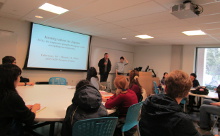
Discussions
Discussions were held at the University of New South Wales, the University of Sydney and the University of Queensland. Based on the study theme, "Do foreign caregivers need to speak the local language fluently?” Depending on what you define fluently, there is an opinion that the ability to understand the terminology used in the profession is necessary, as in the case of the University of Sydney lecturer who gave an elderly person detergent because he could not distinguish between detergent and medication, while the psychological support I was very interested in the fact that the respondents were not biased to one side or the other, with some believing that it is important to have a good command of the Japanese language and that daily conversation in Japanese is sufficient. It was also pointed out that for many foreign workers who come to Japan to work and stay for a short period of time, how motivated they are to learn Japanese, and that Japanese caregivers are needed in Japan because it is much easier to understand each other if they have the same cultural background. I was reminded that there are different barriers to entry in Japan than in Australia, where English is the official language and long-term, permanent residency is allowed.
Interviews for companies and offices
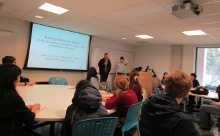
We had a wide range of experiences, from listening to university professors and auditing classes to visiting companies, government agencies, law firms, primary schools and nursing homes. By listening to the stories from different perspectives, I was able to think about Australia's immigration, multiculturalism and an aging society from many different angles. Australia is a nation made up of immigrants by nature, and it was surprising at times that the concept of multiculturalism is so ingrained in our society from an early age that we are not even aware of it, as well as the various measures for multicultural education and inclusion of immigrants. It was an invaluable experience to see the various innovations being made in the care facilities with the dignity of the elderly in mind.
Presentation at Alumni Event
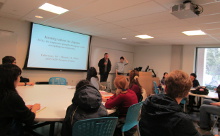
At the AlumniEvent, we had a presentation on the program in Australia and Japan that started in April. It was a very productive presentation that elicited a number of pointed questions from the Alamnai participants.
Idea presentation as 11th Symposium
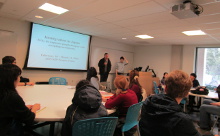
“DiSCo City Plan" was presented at the symposium as the final research report of the one year and two months' study in Australia.
Summary
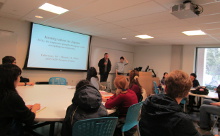
This study trip provided an opportunity for us to think deeply about what kind of society we should aim for as Japan's aging society continues to grow and the acceptance of foreign workers accelerates in the future. By deepening the knowledge of each member, we were able to have more lively discussions in the post-training sessions. I would like to once again express my gratitude to President Packard and the many people who helped make this training possible. (Chika Komine, 4th Year, the University of Tokyo)
Voices from participants
In this study trip, we visited Canberra, Melbourne, Sydney and Brisbane, focusing on aging and immigration issues. As we visited each city and listened to experts from various fields, we learned that there were remnants of the so-called "bamboo ceiling" that prevented Asians from getting ahead in life, and that there were issues such as the exploitation of workers on working holidays that they had never imagined Australia to be capable of dealing with before. I felt that this is not an ideal society. At the same time, it made me rethink the definition of a multicultural society.
The reason why Australia is one of the world's most popular destinations for migrants is because of its 28 consecutive years of economic growth. By allowing family members to accompany migrants when they arrive in the country, the second and third generations contribute to the country's main workforce, a long-term perspective that has created a virtuous cycle that has resulted in this economic growth. This made me realize once again that it is essential to think of things from the perspective of migrants and to look at the issue of migration from a comprehensive perspective that encompasses both economic and political aspects.
Despite the fact that Australia's population is not as aging as Japan's, there are more facilities for healthy elderly people, called "retirement communities," than in Japan, and this gave me a glimpse of the future of Japan as an aging society. I also felt that Japan should learn from the high level of awareness of individual health issues, such as the high volunteer participation rate among the elderly and the many connections within the community through sports. I would like to use the knowledge I gained from this program in my future research and deepen my thinking about what kind of society we want to create in 5 or 60 years. (Yuuka Mitsui, 2nd year, Tokyo University of Foreign Studies)
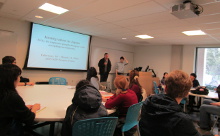
The theme of this year's study trip to Australia was “Migration Policy in a Declining Population.” We had the opportunity to hear from a wide range of people living in Australia, including university professors and students who are familiar with migration and Japan-Australia relations, people from both Australian and Japanese government agencies, and people working for Japanese and local companies. We visited Australia to learn more about the aging population, which is one of the issues of the declining population, and about multiculturalism, which is one of the themes of migration. One of the most impressive things I heard from local students was that in Australia, they have had many opportunities to come into contact with people from very different backgrounds since they were very young, and so they do not feel comfortable interacting with them. Although the number of foreign residents and visitors to Japan is increasing, not a small number of Japanese people are not able to interact with them naturally, and this seems to be a major environmental factor. Some of the participants were impressed by the fact that there are so many foreign students in Australia and that the business has been established as a way to support the Australian economy, while others said that they had met many Australians who knew more about Japan and loved it than we Japanese, and that they wanted to learn more about Japan. In between visits, they had the opportunity to do some sightseeing, and this was a great opportunity for us to experience the advantages and attractions of each of the four cities we visited, as well as the differences between them. I will now look back on my visit and make the most of what I have learned in Australia.
(Leo Kurata, 2nd year, Waseda University)
Perspective from Alumni
Below is a contribution from Alumni in relation to the themeBook recommendations
Here are some of the books that KIP members are exposed to in their daily research.
News
→We were featured on Twitter by the Melbourne Consulate-General
Grant:The Tokyo Club
Itoh Chubei Fund



